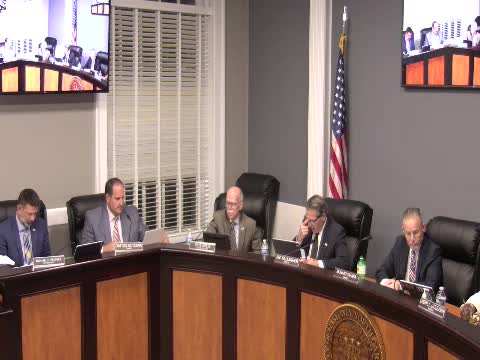Utilities Committee Recommends Net‑Billing for Rooftop Solar; Council OKs Sewer Interlocal and Reimbursement Policy Changes
Get AI-powered insights, summaries, and transcripts
Subscribe
Summary
Gastonia City Council on Nov. 6 approved changes to utility policies: adopting net billing for rooftop solar compensation and authorizing an interlocal sewer agreement to upsize a force main, while also revising the reimbursement policy to remove off‑site reimbursement provisions.
Gastonia City Council considered multiple utilities items Nov. 6, including a change to rooftop solar billing and approvals related to sewer infrastructure and utility policy.
Rooftop solar: Utilities staff presented three billing approaches — a buy‑all/sell‑all framework, net metering (retail credit for exported energy), and net billing (customer consumes on‑site; any exported power purchased by the utility at the utility’s avoided cost). Staff recommended net billing to avoid shifting system infrastructure and fixed‑cost recovery to non‑solar customers. The council adopted the net‑billing approach by motion; staff said a net‑billing framework allows customers to install batteries and receive wholesale/avoided‑cost credit for exported energy while preserving distribution cost allocation for the utility.
Sewer interlocal and force‑main upsizing: Council reviewed an interlocal agreement among the city, Gaston County and High Shoals for sewer construction to serve a new residential development in High Shoals and to provide capacity for potential future industrial growth. The county is funding the project’s construction and design; two‑Rivers/utility staff recommended upsizing a portion of the sewer force main now to accommodate future city growth. The city’s share for upsizing was estimated at about $500,000; the interlocal agreement requires the county to notify the city if bids for upsizing exceed the estimate. Council approved the interlocal agreement after discussion (vote recorded as 5–1 at the meeting).
Reimbursement policy update: Staff reported a revision to the city’s utility reimbursement policy — after surveying about 15 peer utilities, staff recommended removing off‑site reimbursement provisions (where the city reimburses developers to extend mains off the immediate development footprint) while retaining upsizing reimbursement for main sections that provide future city growth capacity. Staff explained the operational and maintenance burdens of long off‑site extensions (water quality, turnover, maintenance) and said most peers do not provide off‑site reimbursements; council approved the revisions unanimously.
Why it matters: the solar billing shift affects the economics of customer solar and battery configurations and balances cost recovery across utility customers; the sewer agreement and reimbursement policy changes affect future development costs and who bears the expense of extended or upsized mains.
What’s next: staff will implement net‑billing rules and related customer procedures; complete the interlocal agreement and proceed to bid/design as coordinated with Gaston County and High Shoals; staff will publish updated reimbursement policy details for developers.
